Explore the Best AI Image Gallery
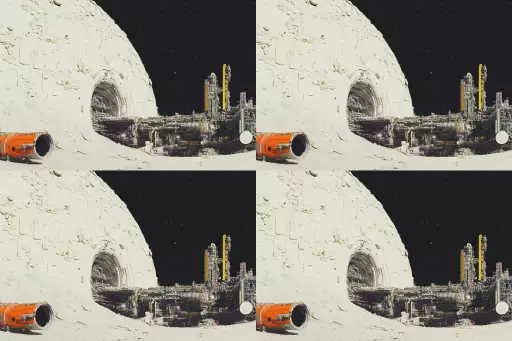
Beyond the Brush: Exploring the Ethical Landscape of AI-Generated Media
The world of art, design, and storytelling is undergoing a seismic shift. Artificial intelligence (AI), once confined to the realms of science fiction, is now capable of generating astonishingly realistic and creative content – from paintings and music to scripts and even code. This surge in AI-generated media presents both exciting opportunities and profound ethical challenges that demand careful consideration.
The Creative Canvas Redefined
AI algorithms, trained on vast datasets of existing works, can now mimic artistic styles, compose original melodies, and even weave compelling narratives. This opens up a world of possibilities for artists, designers, and creators:
- Democratization of Creativity: AI tools can empower individuals with limited artistic skills to express themselves creatively, breaking down traditional barriers to entry in the creative industries.
- Enhanced Efficiency and Productivity: Artists can leverage AI to automate repetitive tasks, freeing up time for more conceptual and innovative work.
- Exploration of New Artistic Frontiers: AI can push the boundaries of creativity by generating novel concepts and forms of expression that transcend human imagination.
Navigating the Ethical Minefield
While the potential benefits are undeniable, the rise of AI-generated media raises several ethical concerns:
- Copyright and Ownership: Who owns the copyright to AI-generated works? Is it the creator of the algorithm, the user who provides input, or the AI itself?
- Authenticity and Deception: How can we distinguish between human-created and AI-generated content? The increasing realism of AI-generated media raises concerns about potential misuse for deception and manipulation.
- Bias and Representation: AI algorithms are trained on existing data, which may perpetuate societal biases and stereotypes. This can lead to the creation of biased and harmful content.
- Job Displacement: The automation capabilities of AI may displace creative professionals in certain fields, raising concerns about unemployment and economic inequality.
Shaping a Responsible Future
Addressing these ethical challenges requires a multi-faceted approach involving:
- Transparent Development and Governance**: Open-source AI models and collaborative frameworks can promote transparency and accountability in the development and deployment of AI tools.
- Education and Awareness: Raising public awareness about the capabilities and limitations of AI-generated media is crucial for informed decision-making and critical consumption.
- Ethical Guidelines and Regulations**: Establishing clear guidelines and regulations for the use of AI in creative industries can help mitigate potential harm and ensure responsible innovation.
- Interdisciplinary Collaboration**: Bringing together experts from diverse fields, including computer science, ethics, law, and the arts, is essential for developing comprehensive solutions to the ethical challenges posed by AI-generated media.
The Canvas of Tomorrow
AI-generated media has the potential to revolutionize the creative landscape, empowering artists, fostering innovation, and expanding the boundaries of human expression. However, navigating the ethical complexities requires a conscious and collaborative effort. By embracing transparency, promoting ethical development practices, and engaging in ongoing dialogue, we can harness the transformative power of AI while safeguarding the values that define creativity and artistic integrity.
](https://images.ai-img.art/thumbnails/150/7c4350a99935771fe343a7ae65c780cf4cd6b861e69cdc32bd58a3a92fb2476f.webp)
![**ultra detailed 8k cinematic black and white beauty portrait of a young woman from chest up, vertical frame, face, hands and hair filling the composition, smooth neutral grey studio background with soft dark vignette on the edges, center of the frame is her eye, lips and finger in a "shh" gesture oval symmetrical face with soft but well defined features, ultra smooth flawless skin, no pores, no wrinkles, perfect beauty retouch, straight elegant nose with soft highlight along the bridge and gentle shadow under the tip full sensuous lips with a sharp cupid’s bow, slightly parted, a thin bright glossy highlight strip on the lower lip emphasizing volume, subtle light reflection on the lip gloss one eye visible through a gap between fingers, other eye mostly hidden by the upper hand, long thick eyelashes like fake lashes, small bright catchlight in the pupil, upper eyelid with smoky eye makeup, darker tone along lash line fading smoothly towards the brow, dark thick well shaped eyebrows, gently arched, not overdramatic dark wavy hair, big glossy waves falling down, one clear S-shaped wave on the right side of the frame, soft highlights along the strands to show texture, hair swept away from the cheeks so the face is not covered both hands in thin semi-transparent black gloves up to the forearm, upper hand placed horizontally across the upper face, back of the hand towards camera, fingers slightly spread so that one finger is above the brows and another lower finger creates a narrow gap that reveals the eye, fingertips long and tapered, sharp stiletto-like nails visible under the sheer fabric, subtle darker seams along the fingers and glove edges lower hand bent so that the index finger is vertical and gently touching the center of the lips in a classic "shhh" pose, [...]** - Image #2 <@1264899319799222315>](https://images.ai-img.art/thumbnails/150/d87499f6bdc5a4a822aea4674654f70073b052542a1aaa1d08461a13ca2e07f9.webp)



](https://images.ai-img.art/thumbnails/150/5487dcbcab0cd5702a67cc6819342ef56c05d0fc7730bfb7718ee291f10c3da3.webp)

](https://images.ai-img.art/thumbnails/150/4f3d83c4b1d979b5be00f4ea80d67b71c0335bc1163e692d738e553ac37709e5.webp)

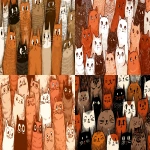



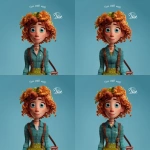


](https://images.ai-img.art/thumbnails/150/f3411154f4c743a26f102ecfc985f3f6214e93b285748fac66c88f3b52f85b26.webp)
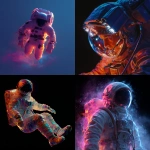






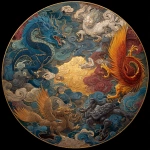
![**ultra detailed 8k cinematic black and white beauty portrait of a young woman from chest up, vertical frame, face, hands and hair filling the composition, smooth neutral grey studio background with soft dark vignette on the edges, center of the frame is her eye, lips and finger in a "shh" gesture oval symmetrical face with soft but well defined features, ultra smooth flawless skin, no pores, no wrinkles, perfect beauty retouch, straight elegant nose with soft highlight along the bridge and gentle shadow under the tip full sensuous lips with a sharp cupid’s bow, slightly parted, a thin bright glossy highlight strip on the lower lip emphasizing volume, subtle light reflection on the lip gloss one eye visible through a gap between fingers, other eye mostly hidden by the upper hand, long thick eyelashes like fake lashes, small bright catchlight in the pupil, upper eyelid with smoky eye makeup, darker tone along lash line fading smoothly towards the brow, dark thick well shaped eyebrows, gently arched, not overdramatic dark wavy hair, big glossy waves falling down, one clear S-shaped wave on the right side of the frame, soft highlights along the strands to show texture, hair swept away from the cheeks so the face is not covered both hands in thin semi-transparent black gloves up to the forearm, upper hand placed horizontally across the upper face, back of the hand towards camera, fingers slightly spread so that one finger is above the brows and another lower finger creates a narrow gap that reveals the eye, fingertips long and tapered, sharp stiletto-like nails visible under the sheer fabric, subtle darker seams along the fingers and glove edges lower hand bent so that the index finger is vertical and gently touching the center of the lips in a classic "shhh" pose, [...]** - Image #3 <@1264899319799222315>](https://images.ai-img.art/thumbnails/150/4c03a422708b372b43caaee1e2929933c40f0a13dc069beeeb228a60b126223b.webp)
](https://images.ai-img.art/thumbnails/150/d08f607caf4a5c380defef68b778febb8911e8e51e51927b09ed67880bd3084b.webp)
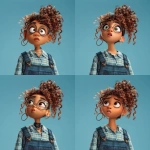

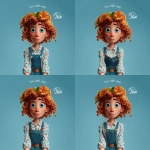
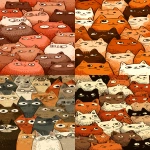

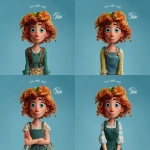





](https://images.ai-img.art/thumbnails/150/1871c145bfe0276c6e1bacf6ec0da6d2dae71370bf71674589af29a201acdd5f.webp)
![**ultra detailed 8k cinematic black and white beauty portrait of a young woman from chest up, vertical frame, face, hands and hair filling the composition, smooth neutral grey studio background with soft dark vignette on the edges, center of the frame is her eye, lips and finger in a "shh" gesture oval symmetrical face with soft but well defined features, ultra smooth flawless skin, no pores, no wrinkles, perfect beauty retouch, straight elegant nose with soft highlight along the bridge and gentle shadow under the tip full sensuous lips with a sharp cupid’s bow, slightly parted, a thin bright glossy highlight strip on the lower lip emphasizing volume, subtle light reflection on the lip gloss one eye visible through a gap between fingers, other eye mostly hidden by the upper hand, long thick eyelashes like fake lashes, small bright catchlight in the pupil, upper eyelid with smoky eye makeup, darker tone along lash line fading smoothly towards the brow, dark thick well shaped eyebrows, gently arched, not overdramatic dark wavy hair, big glossy waves falling down, one clear S-shaped wave on the right side of the frame, soft highlights along the strands to show texture, hair swept away from the cheeks so the face is not covered both hands in thin semi-transparent black gloves up to the forearm, upper hand placed horizontally across the upper face, back of the hand towards camera, fingers slightly spread so that one finger is above the brows and another lower finger creates a narrow gap that reveals the eye, fingertips long and tapered, sharp stiletto-like nails visible under the sheer fabric, subtle darker seams along the fingers and glove edges lower hand bent so that the index finger is vertical and gently touching the center of the lips in a classic "shhh" pose, [...]** - Image #4 <@1264899319799222315>](https://images.ai-img.art/thumbnails/150/8507c113aa12343ebd50af4ab9c637a6cf1acf21c55772271eb6a66bb04fa39c.webp)
![**ultra detailed 8k cinematic black and white beauty portrait of a young woman from chest up, vertical frame, face, hands and hair filling the composition, smooth neutral grey studio background with soft dark vignette on the edges, center of the frame is her eye, lips and finger in a "shh" gesture oval symmetrical face with soft but well defined features, ultra smooth flawless skin, no pores, no wrinkles, perfect beauty retouch, straight elegant nose with soft highlight along the bridge and gentle shadow under the tip full sensuous lips with a sharp cupid’s bow, slightly parted, a thin bright glossy highlight strip on the lower lip emphasizing volume, subtle light reflection on the lip gloss one eye visible through a gap between fingers, other eye mostly hidden by the upper hand, long thick eyelashes like fake lashes, small bright catchlight in the pupil, upper eyelid with smoky eye makeup, darker tone along lash line fading smoothly towards the brow, dark thick well shaped eyebrows, gently arched, not overdramatic dark wavy hair, big glossy waves falling down, one clear S-shaped wave on the right side of the frame, soft highlights along the strands to show texture, hair swept away from the cheeks so the face is not covered both hands in thin semi-transparent black gloves up to the forearm, upper hand placed horizontally across the upper face, back of the hand towards camera, fingers slightly spread so that one finger is above the brows and another lower finger creates a narrow gap that reveals the eye, fingertips long and tapered, sharp stiletto-like nails visible under the sheer fabric, subtle darker seams along the fingers and glove edges lower hand bent so that the index finger is vertical and gently touching the center of the lips in a classic "shhh" pose, [...]** - Image #1 <@1264899319799222315>](https://images.ai-img.art/thumbnails/150/ff5a24c7c060f5350508823c406c28c9596aea4e37eefb60abc0f37504a37383.webp)





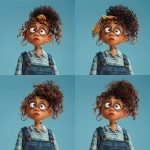
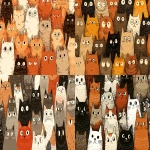
](https://images.ai-img.art/thumbnails/150/e07ad2e7379a835127482b0fd3176192c001c90e68a85b4315cf482b6a3f5ea5.webp)
